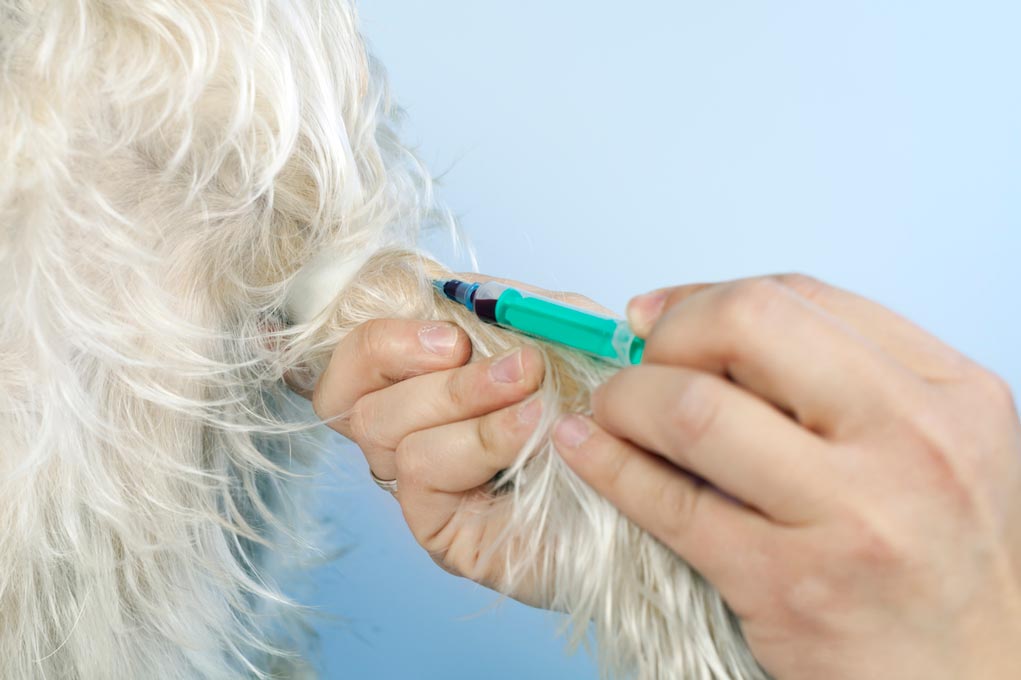Common Blood Tests Done on Dogs

Blood testing is commonly done on dogs for purposes of diagnosis, monitoring response to treatment, and early detection of conditions. Here, we list some of the most common blood tests that veterinarians recommend for dogs and what information they provide.
CBC: Complete Blood Count
A CBC is a blood test that can give a veterinarian a wealth of information. It provides counts of various types of blood cells. The total white blood count is reported as well as a breakdown of the types of white blood cells present, and the same is done for red blood cells. Platelet levels are also reported.
If there is an abnormal result, such as a very low platelet level, a CBC that has been sent to a laboratory may be examined by a pathologist to determine whether there are organisms or abnormalities in the cells that might explain the cause.
Hematocrit, or total red blood cell count, can be used to diagnose anemia, dehydration, or polycythemia. Increased total white blood cell count may indicate inflammation, infection, or allergy, and the levels of the individual types of WBCs can help the doctor determine which.
Heartworm Test
A heartworm test is a blood test that identifies whether or not a dog is infected by heartworms. The majority of the time, this test is done quickly in the veterinarian's office by means of a SNAP test, which looks for proteins from the parasite in the blood.
Heartworm disease is serious and can eventually cause death, so most veterinarians recommend testing yearly, even if the dog is on heartworm preventative. Early detection of the disease can positively impact the success of treatment and decrease permanent damage to the dog's heart.
Blood Urea Nitrogen (BUN) and Creatinine
BUN and creatinine are substances in the blood that can be tested for and help indicate the health of a dog's kidneys. While BUN can also be affected by hydration level and certain liver conditions, creatinine is a fairly specific indication of kidney function.
ALT and Bilirubin
ALT and bilirubin are both substances that indicate liver health. When a dog's liver is not functioning properly, these levels might increase. Noting changes in the levels of these chemicals in a dog's blood over time can help a veterinarian catch a liver problem earlier.
Amylase and Lipase
Amylase and lipase are sometimes measured to indicate whether a dog might be suffering from pancreatitis. However, these are not a particularly sensitive way to diagnose that condition, and dogs with pancreatitis could have normal amylase and lipase levels.
Glucose
Blood glucose levels are most often used in dogs to help diagnose diabetes mellitus, during which glucose is high. However, low levels in certain situations can also help point a veterinarian toward the existence of a liver shunt or liver failure from other causes.
Electrolytes
Potassium, sodium, and chloride levels can be affected by a wide variety of illnesses and conditions, including dehydration, kidney failure, and Addison's disease.
Thyroxine (T4)
Thyroxine levels can give a veterinarian general information about a dog's thyroid and alert the doctor to possible hypothyroidism, though further testing might be necessary to confirm that diagnosis.
When Should Dogs Have Blood Tests Done?
There are several times when a veterinarian may recommend that your dog have blood testing performed. They include;
- Prior to surgery, to help the doctor decide whether the liver and kidneys are functioning well enough to handle anesthesia.
- When the pet is sick, to help narrow down the cause.
- During wellness visits, to help determine baseline levels for that pet and to compare to previous years' results to identify possible problems as early as possible.
- Before beginning a medication that is known to be detrimental if a dog has certain problems, like decreased liver or kidney function.
- To monitor the dog's body's response to medications if they are needed long-term, so the drugs can be stopped or modified if the kidneys or liver seem to be responding negatively.
Some veterinary clinics can perform these basic blood tests in-clinic, but others may send them out to labs for quick turnaround times. These basic tests may need to be followed up with more specific ones if they lead the doctor to suspect a certain condition.
You May Also Like These Articles:
X-Rays in Dogs: What Can They Tell Your Vet?
Fine Needle Aspiration: What Is It and What Does It Tell Your Vet?
Disclaimer: This website is not intended to replace professional consultation, diagnosis, or treatment by a licensed veterinarian. If you require any veterinary related advice, contact your veterinarian promptly. Information at DogHealth.com is exclusively of a general reference nature. Do not disregard veterinary advice or delay treatment as a result of accessing information at this site. Just Answer is an external service not affiliated with DogHealth.com.


